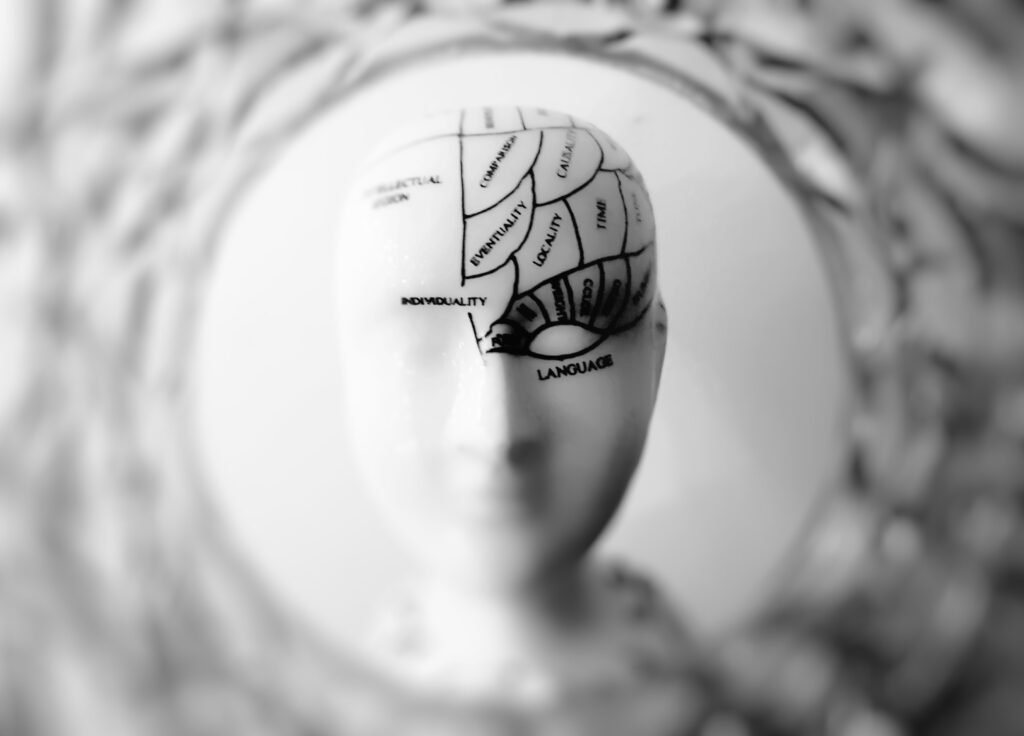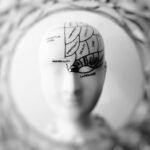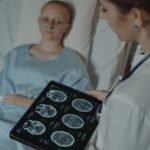Brain tumours are abnormal growths of cells in the brain. These tumours can be cancerous (malignant) or non-cancerous (benign). They can start in the brain (primary tumours) or spread to the brain from other parts of the body (secondary or metastatic tumours).
Common symptoms can include headaches, seizures, changes in vision or hearing, difficulty speaking or understanding speech, weakness or numbness in the limbs, balance problems, cognitive changes, and personality changes.
Looking for information on Brain tumours? This guide covers the symptoms and diagnosis, providing valuable insights for patients and caregivers.
Table of Contents
What are Brain tumours?
Neurological disorders
- How Cerebral Hypoxia can lead to brain damage?

- Bipolar Disorder

- Mononeuropathy

- Poliomyelitis

- Neurodegenerative disorders

- Huntington’s disease (HD)

- Cerebral edema

- Migraine

- Brain Hemorrhage

- Epilepsy

- Polyneuropathy

- Encephalitis

- Increased Intracranial Pressure

- Types of Brain Tumors You Should Know About

- Brain Stroke: Symptoms, Diagnosis and Treatment

Brain tumours are abnormal growths of cells in the brain. These tumours can be cancerous (malignant) or non-cancerous (benign). They can start in the brain (primary tumours) or spread to the brain from other parts of the body (secondary or metastatic tumours).
Primary brain tumours arise from different types of cells in the brain, including glial cells (such as astrocytes, oligodendrocytes, and ependymal cells) and nerve cells (neurons). The most common primary brain tumours are gliomas, which include astrocytomas, oligodendrogliomas, and glioblastomas.
Secondary brain tumours are more common than primary brain tumours, as cancer from other body parts can spread to the brain through the bloodstream. Common types of cancer that can spread to the brain include lung, breast, colon, and melanoma.
Symptoms
Symptoms of brain tumours vary depending on the size, location, and type of tumour. Common symptoms include:
- Headaches: Persistent or worsening headaches that may occur in the morning or at night.
- Nausea and vomiting: Especially in the morning or with changes in body position.
- Fatigue: Persistent tiredness or lack of energy.
- Seizures: Sudden, uncontrolled movements or changes in consciousness.
- Vision or hearing changes: Blurred vision, double vision, loss of peripheral vision, or hearing loss.
- Speech difficulties: Difficulty speaking or understanding speech.
- Weakness or numbness: Weakness or numbness in the limbs, often on one side of the body.
- Balance problems: Difficulty with balance or coordination, clumsiness, or frequent falls.
- Cognitive changes: Memory problems, difficulty concentrating, confusion, or changes in thinking or reasoning abilities.
- Personality or behaviour changes: Irritability, mood swings, depression, or personality changes.
It’s important to note that various conditions can cause these symptoms, and experiencing one or more symptoms does not necessarily mean you have a brain tumour. Suppose you are concerned about any of these symptoms. In that case, seeking medical attention for a proper diagnosis and appropriate treatment is essential.
Who is more likely to get Brain tumours?
Brain tumours can affect anyone, regardless of age, gender, or ethnicity. However, certain factors may slightly increase the likelihood of developing brain tumours in certain individuals. These risk factors include:
Causes and Risk Factors
- Age: Certain brain tumours, like glioblastomas, are more commonly diagnosed in older adults. However, brain tumours can occur at any age, affecting children and young adults.
- Family history: Certain genetic conditions, such as neurofibromatosis, Li-Fraumeni syndrome, and tuberous sclerosis, can increase the risk of developing brain tumours. However, most brain tumours occur in individuals without a family history of the condition.
- Exposure to ionizing radiation: High doses of ionizing radiation, such as radiation therapy for other cancers or exposure to radiation during nuclear accidents, may increase the risk of developing brain tumours.
- Immunodeficiency: People with weakened immune systems, such as human immunodeficiency virus (HIV) infection or those who have undergone organ transplantation and are taking immunosuppressive drugs, may have a slightly higher risk of developing brain tumours.
It is important to note that most brain tumours occur sporadically without any known risk factors. If you have concerns about your risk, consult your physician.
How is a Brain tumour diagnosed?
A brain tumour may be diagnosed using several different methods:
- Medical history: The doctor will ask about the patient’s symptoms, family history, and any previous health conditions that may contribute to the development of tumours.
- Physical examination: The doctor will perform a physical examination to check for any neurological abnormalities, such as changes in vision, coordination, or speech.
- Neurological examination: This involves testing various neurological functions, such as reflexes, strength, coordination, and sensation.
- Imaging tests: Various imaging tests can help identify the presence and location of a brain tumour. These may include:
- Magnetic resonance imaging (MRI): Uses powerful magnets and radio waves to create detailed pictures of the brain.
- Computed tomography (CT) scan: Combines X-rays taken from multiple angles to create cross-sectional brain images.
- Positron emission tomography (PET) scan shows the brain’s activity and can help determine if a tumour is cancerous.
- Angiogram: Involves injecting a dye into the blood vessels to visualize blood flow in the brain and identify any abnormalities.
5. Biopsy: A tissue sample is collected from the brain through surgery or a needle to examine it
Diagnosis of Neurological Disorders
How is a Brain tumour treated?
Neurologists in Mumbai
- Dr. Deepak Solanki- Neuroanaesthetist at Artemis Hospitals, Gurugram

- Dr. Amit Kumar Shridhar- Spine Surgeon at Balaji Action Medical Institute, Delhi
- Dr. Ashwin Garg- Neuro Radiologist at Balaji Action Medical Institute, Delhi
- Dr. Prashant Goyal- Psychiatrist at Balaji Action Medical Institute, Delhi
- Dr. Pallavi Joshi- Clinical Psychologist at Balaji Action Medical Institute, Delhi
- Dr. Prachi- Clinical Psychologist at Balaji Action Medical Institute, Delhi
- DR. TARUN MATHUR- Neurologist and Interventional Neurologist at Paras Hospital, Udaipur

- DR. ANURAG LAMBA- Neurologist at Paras Hospital, Panchkula

- Dr. Aniruddh K Purohit – Neuro and Spine Surgeon at Aster Prime Hyderabad

- Ms. Archana Sharma- Clinical Psychologist at Balaji Action Medical Institute, Delhi

- Dr. Vishnu Gupta- Neuro Surgeon at Fortis Hospital, Punjab

- Dr. Vivek Vaid- Neuro Surgeon at Fortis Hospital, Jaipur

- Dr. Utkarsh Bhagat – Neuro Surgeon at Fortis Hospital, Haryana

- Dr. Sweety Trivedi- Neurologist at Fortis Hospital, Noida

- DR. SWETA SINGLA- Neurologist at Venkateshwara Hospital, Delhi

- Dr. Sumit Singh – Neurologist at Artemis Hospitals, Gurugram

- Dr. Soundappan V- Neuro and Spine Surgeon at Fortis Hospital, Chennai

- Dr. Sonal Gupta- Neuro Surgeon at Fortis Hospital, Delhi

- Dr. Shailaja Pokhriyal- CLINICAL PSYCHOLOGIST at BLK Hospital, Delhi

- Dr. Shanti Shankar Praharaj- Neuro and Spine Surgeon at Fortis Hospital, Karnataka

- Dr. Satish Satyanarayana- Neuro and Spine Surgeon at Fortis Hospital, Karnataka

- Dr. Sandhya Koche- Neurologist at Balaji Action Medical Institute, Delhi

- Dr. S Rajesh Reddy – Neuro Surgeon In Hyderabad

- Dr. SANDEEP VAISHYA- Neuro Surgeon at Fortis Hospital, Haryana

- Dr. Rohit Gupta- Neurologist at Fortis Hospital, Haryana

References
- Brain & Central Nervous System Cancer. http://www.bccancer.bc.ca/health-info/types-of-cancer/brain-central-nervous-system
- Brain Tumors – Classifications, Symptoms, Diagnosis and Treatments. https://www.aans.org/en/Patients/Neurosurgical-Conditions-and-Treatments/Brain-Tumors





































